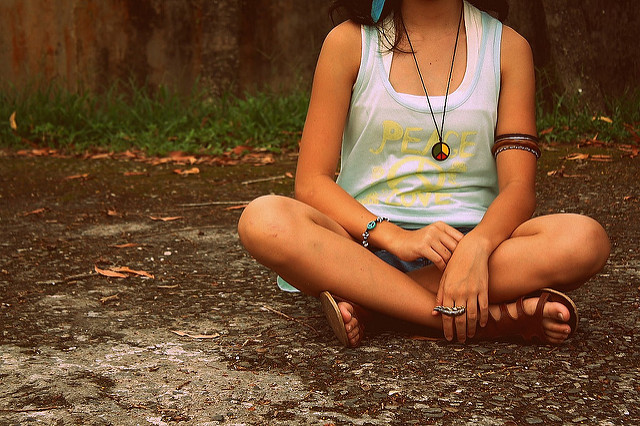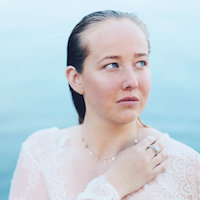
There’s nothing quite like the commune life: Freedom—running naked, days without showers, bare feet, getting high, and nightly orgies—and I’m pretty sure that’s what my family had in mind when I told them I was moving to a Costa Rican community at age 17.
I’ve always been an independent, wildflower child. I dreamed about visiting the Middle East, going on African safaris, and solo backpacking across Europe.
Not much scared me, and to this day, not much does now.
It made sense that I would move out of the country at 17. I knew I wasn’t going to go to college or university right away—my plan was to work.
Instead of working straightaway, I packed up my bag for a three month adventure. The “University of Life” as I liked to call it. Long story short, three months became three years—sorry mums everywhere, that’s probably not what you wanted to hear.
But those three years were the most transformational years of my life. There is so much I learned and grew in that time, I could write a whole book or two, and probably will someday.
My experience of living in a community was unlike the stereotype of “hippy commune living”—I showered every day (did I really need to state that?), there were no drugs, there was no chanting and holding hands. It was “normal” healthy living—different than many people’s lives, but enriching and filled with practical teachings.
There are a few practical lessons I’ve narrowed down that stuck with me, which anyone can bring to where they are now—no moving to a jungle commune necessary.
1. Going meat-free.
I became vegetarian when I moved to the community and I saw first-hand the destruction cattle has on the land. The mountain we looked onto was once fully pristine primary forest. Now, much of the primary forest has been destroyed for the use of cattle farming. The mountain has largely eroded due to deforestation, and nutrients leached from the once rich soils. The many native species of animals and plants were either destroyed, or forced to move up the mountain to find food and water or for more space and protection.
Because of this, I woke up to the many other reasons eating meat is one of the worst things you can do for the environment, and I realized eating meat no longer aligned with my life views.
Compassionate views came shortly after, and I can now say I practice a vegan lifestyle because of it.
2. Communing with nature.
My living situation was very different than what I grew up with. In Canada, we are very protected from our environment—for good reasons and bad. I grew up with harsh weather, lots of snow in the winter and scorching hot summers, so it’s obvious for many of us to want to live in weather-proofed housing.
In Costa Rica I lived in simple, rustic, wooden houses that were very much a part of the environment itself. Made mostly with wood from fallen trees, these houses were all we needed for the climate we lived in. It protected us from the rain and shaded us from the sun, but other than that, we felt every change of weather. If it was windy outside, we felt it. If it was raining outside, we felt it. If it was hot, we felt that too. It was hard for me to get used to at first, but now I miss that constant connectedness with nature.
An option for us living in Canada or the States is to get outside more. Experience the rain. Watch the stars. Go camping. Just get outside no matter what the temperature. Feeling the earth, the wind in my hair, the sun on my face, always helps ground me and brings me back to my truth.
3. Learning to live with others.
I lived with a lot of different people during my three years in the community (or co-housing as it’s commonly called). People with many different personalities, preferences, stories, nationalities, and of all ages.
Living in such close proximities to the same 30 people on a day-to-day basis was hard at first, but eventually it became second-nature and they became my family. It taught me that people are difficult, loving, harsh, kind, strict, strong, and in the end just human beings trying to do their best with what they have.
We all live on the earth, most of us in big or small communities, whether they be small towns or large cities. Living with others is a necessary skill to have and be good at. To be good at living with others we must practice compassion. Trying to see all sides of a problem and doing our best to leave our ego out of the equation.
Again, it is not easy, but it is necessary for a loving community.
4. Doing jobs we hate.
When I arrived at the community I was a very sheltered suburban girl, unaware of the many physical “hardships” and work needed to be done in order to run a self-sustainable community. Working on the finca (land) was not an easy or laid-back feat. We all had to pull together to achieve everything. For the most part, we all shared the same jobs and the same amount of work.
I came to realize that if these annoying jobs—such as having to dig manure—didn’t get done, we wouldn’t have compost, the vegetables wouldn’t grow, and we wouldn’t have a harvest. In the end, I learned to love them (not necessarily “liking” them but loving them nonetheless).
I learned that every little action or work we do has a purpose. Sometimes we have to power-through a job in order to get it done because other people are counting on us. Other times, we can truly learn to enjoy the work at hand, no matter how difficult or annoying it is.
Focusing on gratitude through meditation is one of the most helpful ways of giving a job our all, in my experience. Bringing that thankfulness to each job at hand is a rewarding way of “getting the job done.”
After all, anything worth doing is worth doing well.
5. Learning meditation.
In the community, I was seriously introduced to meditation for the first time in my life. I was taught so many valuable lessons on how to sit, hold space, and find my way through hardships using meditation. Like anyone who has ever meditated can tell you, it is a transformational practice and it has definitely added so much to my life.
I began slow, learning by my peer’s guided mediations and practicing once before going to bed each night. I eventually craved meditation more and more, as I was able to look inside myself for any questions or uncertainties I had. When life was hard and I didn’t know how or what to do, meditation was there to guide me.
I still count on meditation to get me through hard times. When I am feeling sad, helpless, confused, mad, unbalanced, I know it’s time to sit down and be present with myself.
As daunting as meditation can be, as soon as we are in that sitting position, it gets better and better each time we do it. Just like riding a bike, we must keep getting back on after we fall off.
I can’t physically count all the lessons I learned in the time I lived in the community. I am forever changed and a different person because of my experiences there. I miss my life in the community every day, but I have also learned that we are where we are for a reason. I no longer live in a community, but I believe that if we find the right one, it can be the best, most rewarding, enriching experience one can have. So, my dear family members, please try to be supportive of your loved one’s adventures.
So much growth can come out of new and different experiences.
Author: Pauline Holden
Image: lingorach at Flickr
Editor: Renée Picard








Read 1 comment and reply